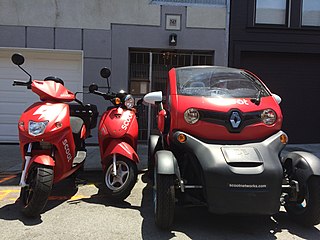
A hobcart was a type of mobility device designed in the late 1960s by Dr. Steven Perry of Albrighton, Shropshire, UK. [1]

A hobcart was a type of mobility device designed in the late 1960s by Dr. Steven Perry of Albrighton, Shropshire, UK. [1]
Dr. Steven had two young children, both of whom had spina bifida. He considered that the wheelchairs the children were provided with were liable to set them apart from other children of their age, so set about designing a mobility device that would look like a go-kart. The end result was the hobcart, which was produced at a local borstal when it was first made.[ citation needed ]
The idea behind this was to try to provide the inmates of the borstal the opportunity to be involved in a project which they could see was doing some good. Hobcarts were still being made into the 1980s.

A Segway is a two-wheeled, self-balancing personal transporter device invented by Dean Kamen. It is a registered trademark of Segway Inc. It was brought to market in 2001 as the Segway HT, and then subsequently as the Segway PT.HT is an initialism for "human transporter" and PT for "personal transporter."

A borstal was a type of youth detention centre in the United Kingdom, several member states of the Commonwealth and the Republic of Ireland. In India, such a detention centre is known as a borstal school.

Bajaj Auto Limited is an Indian multinational automotive manufacturing company based in Pune. It manufactures motorcycles, scooters and auto rickshaws. Bajaj Auto is a part of the Bajaj Group. It was founded by Jamnalal Bajaj (1889–1942) in Rajasthan in the 1940s.

A kick scooter is a human-powered street vehicle with a handlebar, deck, and wheels propelled by a rider pushing off the ground with their leg. Today the most common scooters are made of aluminum, titanium, and steel. Some kick scooters made for younger children have 3 to 4 wheels and are made of plastic and do not fold. High-performance kickbikes are also made. A company that had once made the Razor Scooters revitalized the design in the mid-nineties and early two-thousands. Three-wheel models where the frame forks into two decks are known as Y scooters or trikkes.
Scooter may refer to:

A mobility scooter is an electric personal transporter used as mobility aid for people with physical impairment, mostly auxiliary to a powered wheelchair but configured like a motorscooter. When motorized they function as micromobility devices and are commonly referred to as a powered vehicle/scooter, or electric scooter. Non-motorized mobility scooters are less common, but are intended for the estimated 60% of wheelchair users who have at least some use of their legs. Whilst leg issues are commonly assumed to be the reason for using scooters, the vehicles are used by those with a wide range of conditions from spinal injuries to neurological disorders.

A motorized scooter is a stand-up scooter powered by either a small internal combustion engine or electric hub motor in its front and/or rear wheel. Classified as a form of micromobility, they are generally designed with a large center deck on which the rider stands. The first motorized scooter was manufactured by Autoped in 1915.

A wheelchair lift, also known as a platform lift, or vertical platform lift, is a fully powered device designed to raise a wheelchair and its occupant in order to overcome a step or similar vertical barrier.

A mobility aid is a device that helps individuals with mobility impairments to walk or improve their overall mobility.

Colin Furze is a British YouTuber, engineer, and inventor from Stamford, Lincolnshire.
Micro Mobility Systems Ltd, known as Micro, is a Swiss company that produces urban vehicles such as kickscooters and the Microlino, a small electric car which was first presented at the Geneva Motor Show in 2016. In the United States, Micro's products are sold under the brand "Micro Kickboard" for trademark reasons. The company holds several patents for its products.

Moto X is an Android smartphone developed and manufactured by Motorola Mobility, and released in August 2013.

Invalid carriages were usually single seater road vehicles, buggies, or self-propelled vehicles for disabled people. They pre-dated modern electric mobility scooters and, from the 1920s, were generally powered by small gasoline/petrol engines, although some were battery powered. They were usually designed without foot-operated controls.

A self-balancing scooter is a self-balancing personal transporter consisting of two motorized wheels connected to a pair of articulated pads on which the rider places their feet. The rider controls the speed by leaning forward or backward, and direction of travel by twisting the pads.

Steven Neil Durlauf is an American social scientist and economist. He is currently Frank P. Hixon Distinguished Service Professor and the inaugural Director of the Stone Center for Research on Wealth Inequality and Mobility at the Harris School of Public Policy Studies at the University of Chicago. Durlauf was previously the William F. Vilas Research Professor and Kenneth J. Arrow Professor of Economics at the University of Wisconsin-Madison. As of 2021, is also a Part Time Professor at the New Economic School.

A personal transporter is any of a class of compact, mostly recent, motorised micromobility vehicle for transporting an individual at speeds that do not normally exceed 25 km/h (16 mph). They include electric skateboards, kick scooters, self-balancing unicycles and Segways, as well as gasoline-fueled motorised scooters or skateboards, typically using two-stroke engines of less than 49 cc (3.0 cu in) displacement. Many newer versions use recent advances in vehicle battery and motor-control technologies. They are growing in popularity, and legislators are in the process of determining how these devices should be classified, regulated and accommodated during a period of rapid innovation.

The digital divide in Germany, the second most populous state and leading economic powerhouse in Europe, refers to the ever-growing gap between members of society without computer or Internet access and those with access. There are several factors contributing to the digital divide in Germany, including age, gender, family structure, education, ethnicity, and motivation. With a large market of Information and Communications Technology (ICT) in Germany, there are still areas that don't have access to high-speed internet. Internet access in Germany is more available in big cities compared to rural communities. The German government has taken initiative to increase internet access through the rural communities by adding free internet access throughout the communities, as well as, increase internet education in schools.

Scoot Networks, also known as just Scoot or Scoot Rides, is an American company which provides public electric scooter and electric bicycle sharing systems. The company is based in San Francisco, California.

A scooter-sharing system or kicksharing system is a shared transport service in which electric motorized scooters are made available to use for short-term rentals. E-scooters are typically "dockless", meaning that they do not have a fixed home location and are dropped off and picked up from certain locations in the service area.

Micromobility refers to a range of small, lightweight vehicles, driven by users personally. Micromobility devices include bicycles, velomobiles, e-bikes, electric scooters, electric skateboards, shared bicycle fleets, and electric pedal assisted (pedelec) bicycles.